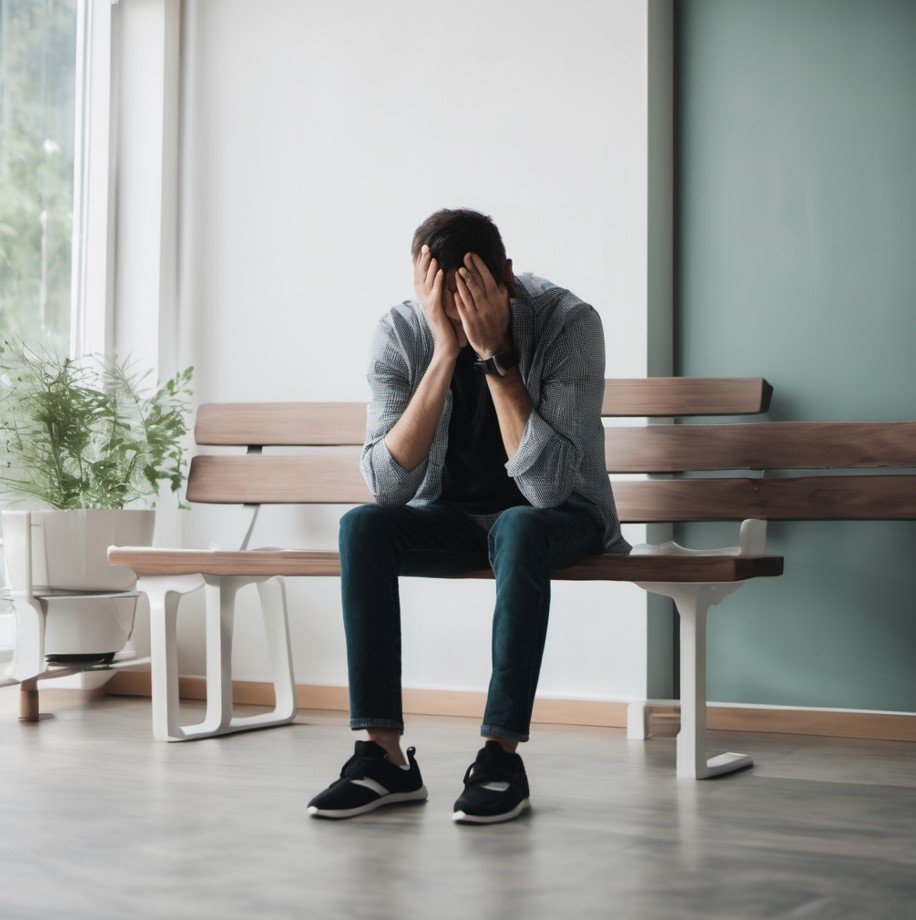Social anxiety is a common mental health condition characterized by an intense fear of social situations and interactions. It can greatly impact an individual’s daily life, causing distress and hindering their ability to form and maintain relationships. According to the National Institute of Mental Health, an estimated 9.1% of the US adolescent population has experienced social anxiety at some point in their lives. However, with proper self-help strategies, it is possible to break free from the grip and live a fulfilling life.
Here’s what you need to know and how to overcome it:
Social anxiety can manifest in various ways, including physical and emotional symptoms. Physical symptoms may include sweating, trembling, nausea, and an increased heart rate, while emotional symptoms may include fear of judgment, embarrassment, and difficulty speaking in social situations.
The exact cause of social anxiety is not yet known, but it is believed to be a combination of genetic and environmental factors. People with a family history of anxiety or those who have experienced traumatic events are more likely to develop it. Additionally, shyness and introversion can also contribute to the development of social anxiety.
To overcome social anxiety, seeking professional help is crucial. Therapists can provide guidance and support through cognitive-behavioral therapy and exposure therapy. Along with therapy, practicing mindfulness and relaxation techniques, challenging negative thoughts and beliefs, and gradually exposing oneself to social situations can also be effective in managing it.
In addition to seeking professional help, there are self-help strategies that individuals can implement to manage their social anxiety. These include setting realistic goals, taking care of physical health, practicing self-care and self-compassion, and learning to say no to overwhelming social situations.
Coping strategies such as deep breathing and relaxation techniques, positive self-talk, visualization and imagery, and using humor can also help individuals manage their social anxiety in the moment. It is important to continue practicing these strategies and seeking professional help to maintain progress and manage symptoms in the long term. With dedication and perseverance, it is possible to overcome social anxiety and live a fulfilling life.
Key Takeaways:
- Seek professional help and gradually expose yourself to social situations to overcome social anxiety.
- Take care of your physical health, practice self-care and self-compassion, and learn to say no to manage social anxiety.
- Use coping strategies such as deep breathing, positive self-talk, and visualization to deal with social anxiety.
What Is Social Anxiety?
Social anxiety, also known as social phobia, is a debilitating fear of social situations, often triggered by the fear of being judged or evaluated by others. Individuals with social anxiety may experience intense self-consciousness and anxiety in common social situations. This can result in avoiding social events and can greatly impact one’s daily life.
How Does Social Anxiety Affect People?
- Physical Symptoms: People with social anxiety may experience sweating, trembling, or a rapid heartbeat.
- Emotional Impact: This condition can cause individuals to feel fear, embarrassment, and a strong desire to avoid social situations.
- Cognitive Effects: Negative thoughts, self-doubt, and difficulty concentrating are common among those with social anxiety.
- Behavioral Changes: Some may avoid social interactions, have difficulty speaking, or seek excessive reassurance.
What Are The Symptoms Of Social Anxiety?
Social anxiety can manifest in a variety of ways, affecting both our physical and emotional well-being. In this section, we will discuss the different symptoms of social anxiety to help you recognize and understand them better. From the physical sensations to the emotional responses, we will explore how social anxiety can impact our daily lives and relationships. By gaining a deeper understanding of these symptoms, we can begin to take steps towards overcoming them and breaking free from our fears.
1. Physical Symptoms
- Increase in heart rate and palpitations
- Sweating and trembling
- Upset stomach or nausea
- Muscle tension and shaky voice
- Shortness of breath and dizziness
Pro-tip: Engage in regular physical exercise to manage and reduce the physical symptoms of social anxiety.
2. Emotional Symptoms
Emotional symptoms of social anxiety include:
- Intense fear or worry before social events.
- Avoidance of social situations.
- Self-consciousness.
- Embarrassment.
- Excessive concern about being judged or evaluated negatively.
These symptoms can lead to overwhelming distress and persistent avoidance of social interactions, greatly impacting daily functioning and overall well-being.

Social anxiety disorder is characterized by an intense fear of social situations, where individuals feel judged or scrutinized by others. Symptoms include physical signs like sweating and trembling, avoidance of social interactions, excessive self-consciousness, negative thoughts, and difficulty speaking in social settings, often leading to significant disruption in daily life and relationships.
What Are The Causes Of Social Anxiety?
Social anxiety can be debilitating, hindering individuals from fully enjoying social interactions and everyday life. But what are the underlying causes of this common mental health issue? In this section, we will explore two main factors that contribute to social anxiety: genetics and environmental factors. By understanding these causes, we can gain insight into our own experiences and develop effective strategies to overcome social anxiety.
1. Genetics
- Genetics play a crucial role in the development of social anxiety, with studies showing a significant hereditary component.
- Specific genes related to the regulation of serotonin and the function of the amygdala may contribute to an individual’s vulnerability to social anxiety.
- When combined with environmental factors, a genetic predisposition can increase the likelihood of developing social anxiety.
A fascinating historical case of genetic influence is the 2012 discovery of the first gene linked to social anxiety, providing insight into the biological foundations of this intricate condition.
2. Environmental Factors
- Family dynamics: Growing up in an environment where family members model or reinforce avoidance behaviors can contribute to the development of social anxiety.
- Peer interactions: Negative experiences with peers, such as bullying or rejection, can significantly impact the onset and persistence of social anxiety.
- Social learning: Observing and internalizing social fears from parents or caretakers can shape an individual’s susceptibility to social anxiety.
What Are The Risk Factors For Developing Social Anxiety?
Social anxiety is a common struggle that can greatly impact one’s daily life and relationships. In this section, we will take a closer look at the risk factors that may contribute to the development of social anxiety. These include family history, traumatic events, and personality traits such as shyness and introversion. By understanding these risk factors, we can gain insight into the root causes of social anxiety and begin to break free from its grasp.
1. Family History
- Evaluate the family history for any instances of social anxiety disorders.
- Identify any patterns of avoidance or distress in social situations that may run in the family.
- Consider the influence of family dynamics on the development of social anxiety.
2. Traumatic Events
- Recognize the impact: Acknowledge the effect of traumatic events on your social anxiety.
- Seek professional help: Consult a therapist or counselor to address and process the impact of the traumatic events.
- Join support groups: Connect with individuals who have experienced similar traumatic events to share experiences and coping strategies.
- Practice self-care: Engage in activities that promote relaxation, mindfulness, and emotional well-being.
3. Shyness and Introversion
- Recognize traits: Understand that shyness and introversion are natural personality characteristics.
- Self-acceptance: Embrace your shyness and introversion and acknowledge that it is okay to be reserved or prefer solitude.
- Set boundaries: Communicate your comfort level with social interactions and establish boundaries that align with your needs.
- Self-care: Prioritize self-care and allocate time for activities that recharge your energy and provide comfort.

Overcoming social anxiety often involves a combination of therapy, such as cognitive-behavioral therapy, which helps individuals change negative thought patterns, and sometimes medication to manage symptoms. Additionally, gradual exposure to feared social situations, along with relaxation techniques and building social skills, can significantly improve confidence and reduce anxiety over time.
How Can You Overcome Social Anxiety?
Social anxiety can be a crippling condition that holds us back from fully enjoying our lives. But fear not, there are ways to break free from this burden and live a more confident and fulfilling life. In this section, we will discuss five self-help strategies that can help you overcome it. From seeking professional help to building a support network, each approach offers unique benefits and can greatly improve your overall well-being. Let’s dive in and discover how you can overcome social anxiety.
1. Seek Professional Help
- Seek the assistance of a mental health professional, such as a psychologist or psychiatrist, who specializes in treating anxiety disorders.
- Discuss various treatment options, including therapy (such as CBT or exposure therapy) and medication, to develop a personalized plan that works for you.
- Participate in individual or group therapy sessions to address the underlying causes of your anxiety and learn effective coping strategies.
- Make a commitment to your treatment and follow through with the recommendations of your professional for optimal results.
2. Practice Mindfulness and Relaxation Techniques
When practicing mindfulness and relaxation techniques to overcome social anxiety, consider the following steps:
- Engage in deep breathing exercises to calm the mind and body.
- Practice meditation to cultivate a present-focused mindset.
- Utilize progressive muscle relaxation to release tension and promote physical relaxation.
- Engage in activities such as yoga or tai chi to enhance mindfulness and reduce stress.
- Allocate time for hobbies that bring joy and foster relaxation.
During the Edo period in Japan, Zen Buddhism emerged as a prominent practice, emphasizing mindfulness and meditation to achieve mental tranquility.
3. Challenge Negative Thoughts and Beliefs
- Identify negative thoughts: Recognize and acknowledge recurring negative thoughts and beliefs.
- Challenge Negative Thoughts and Beliefs: Question the validity of negative thoughts and replace them with more balanced and realistic perspectives.
- Evaluate evidence: Seek evidence for and against negative beliefs, fostering a more rational outlook.
- Consider alternative explanations: Explore alternative reasons for situations, avoiding jumping to negative conclusions.
- Practice positive affirmations: Cultivate positive self-talk and affirmations to counteract negative beliefs.
4. Gradually Expose Yourself to Social Situations
Gradually exposing yourself to social situations is an essential step in overcoming social anxiety. Here are the steps to follow:
- Start with small, low-pressure social settings, such as a coffee shop or a walk in the park.
- Gradually increase the complexity of social interactions by attending group activities or joining a club.
- Practice relaxation techniques to manage anxiety during exposure.
- Set achievable goals and celebrate progress.
Alex, who struggled with social anxiety, started by attending small gatherings with close friends. Over time, he joined a book club and eventually gave a presentation at work, successfully managing his anxiety.
5. Build a Support Network
- Connect with understanding friends or family members who can offer encouragement and reassurance.
- Join support groups or social clubs to interact with individuals who share similar experiences, fostering mutual understanding and empathy.
- Consider seeking professional help from therapists, counselors, or mental health professionals for guidance and structured assistance.
Did you know that building a strong support network, such as joining support groups or connecting with understanding friends and family members, can greatly help alleviate the impact of social anxiety on an individual’s well-being?

Seeking professional help is vital for tackling social anxiety. Psychologists and psychiatrists can offer tailored therapies like cognitive-behavioral therapy and exposure therapy. This expert guidance helps individuals change negative thought patterns and safely face social situations, providing essential tools for overcoming social anxiety and improving daily interactions. Contact East Coast Telepsychiatry for more assistance.
What Are Some Self-Help Strategies for Managing Social Anxiety?
Social anxiety can be a debilitating condition, causing individuals to feel anxious and self-conscious in social situations. However, there are self-help strategies that can assist in managing and overcoming this type of anxiety. In this section, we will discuss some effective techniques for managing it, including setting realistic goals, prioritizing physical health, practicing self-care and self-compassion, and learning to say no. By incorporating these strategies into your daily life, you can break free from fears and live a more confident and fulfilling life.
1. Set Realistic Goals
- Identify specific, achievable objectives related to social interactions and public exposure.
- Break down larger goals into smaller, manageable steps for gradual progress.
- Track your achievements and adjust goals as needed to ensure they remain realistic yet challenging.
2. Take Care of Your Physical Health
- Exercise Regularly: Engage in physical activities such as walking, jogging, or yoga to take care of your physical health and alleviate anxiety symptoms.
- Eat Well: Maintain a balanced diet rich in fruits, vegetables, lean proteins, and whole grains to promote overall physical health.
- Get Sufficient Sleep: Ensure you have a consistent sleep schedule, aiming for 7-9 hours of quality sleep each night.
- Avoid Substance Abuse: Minimize alcohol and caffeine consumption, as they can exacerbate anxiety symptoms.
- Regular Medical Check-ups: Schedule routine health check-ups to monitor and address any physical health concerns.
3. Practice Self-Care and Self-Compassion
- Set aside ‘me time’ for activities that bring you joy and relaxation as a way of practicing self-care.
- Engage in self-compassion through positive affirmations and acknowledging your strengths.
- Nurture your physical health by incorporating regular exercise, balanced nutrition, and sufficient sleep into your routine.
- Connect with supportive friends or family members to foster emotional well-being and practice self-compassion.
Remember, practicing self-care and self-compassion is crucial for managing social anxiety and maintaining overall mental wellness.
4. Learn to Say No
- Recognize your limits and priorities.
- Communicate assertively and respectfully.
- Practice declining without guilt.
- Offer alternatives whenever possible.
- Set clear boundaries and stick to them.
Learning to say no is crucial for maintaining your well-being and managing social anxiety. It’s important to prioritize your mental health and respectfully decline commitments that may be overwhelming. Remember, it’s okay to say no and set boundaries for yourself.

Coping strategies for social anxiety include practicing deep breathing and relaxation techniques to reduce physical symptoms of anxiety, gradually exposing oneself to social situations to build confidence, using positive affirmations to combat negative self-talk, seeking support from friends, family, or support groups, and maintaining a healthy lifestyle with regular exercise and adequate sleep to improve overall mental health. Mindfulness and cognitive-behavioral techniques, like challenging irrational fears and beliefs, are also effective in managing and reducing social anxiety.
What Are Some Coping Strategies for Dealing with Social Anxiety?
Social anxiety can be a debilitating condition, affecting one’s ability to engage in social situations and hindering personal growth. However, there are ways to cope and overcome this fear. In this section, we will discuss some effective strategies for dealing with social anxiety. From deep breathing and relaxation techniques to positive self-talk and visualization, these methods can help individuals break free from the grip of social anxiety and live a more fulfilling life.
1. Deep Breathing and Relaxation Techniques
- Find a quiet and comfortable place to sit or lie down.
- Close your eyes and take a slow, deep breath in through your nose, allowing your belly to rise as you practice deep breathing.
- Hold your breath for a few seconds, and then exhale slowly through your mouth, letting your belly fall as you release tension.
- Repeat this deep breathing exercise several times, focusing on your breath and letting go of tension with each exhalation.
- Combine deep breathing with progressive muscle relaxation for enhanced stress relief and relaxation.
2. Positive Self-Talk
- Identify negative thoughts: Recognize self-critical or fearful thoughts.
- Challenge irrational beliefs: Counter negative thoughts with realistic affirmations.
- Practice affirmations: Use positive statements to build self-confidence and reduce anxiety.
- Seek professional guidance: A therapist can offer personalized techniques for positive self-talk.
Social anxiety can be managed with practice and support. Additionally, incorporating positive self-talk into daily routines can greatly improve one’s ability to cope with social anxiety.
3. Visualization and Imagery
Utilizing visualization and imagery can help in managing social anxiety through the following steps:
- Imagine a Positive Outcome: Visualize successful social interactions and positive outcomes to reframe your mindset.
- Practice Regularly: Set aside time daily for visualization exercises to strengthen this coping technique.
- Use All Senses: Engage all senses in your visualization to make it more vivid and impactful.
For those dealing with social anxiety, incorporating visualization and imagery techniques into daily routines can aid in managing and overcoming social fears.
Frequently Asked Questions
What is social anxiety and how can a self-help guide help me overcome it?
Social anxiety is a mental health condition where an individual experiences intense fear or discomfort in social situations. A self-help guide, based on evidence-based research and developed by mental healthcare professionals, can provide tools and strategies to challenge unhelpful thought patterns and behaviors, and reduce symptoms of social anxiety. It can also serve as a first step or supplement to seeking professional treatment.
Who can benefit from using this self-help guide for social anxiety?
This self-help guide is intended for individuals who are experiencing mild to moderate symptoms of social anxiety. It can be used by anyone who wants to learn more about managing their symptoms and improving their social interactions, whether or not they have been diagnosed with social anxiety disorder.
Is this self-help guide reviewed by medical professionals?
Yes, this self-help guide has been reviewed by a medical review board, including board-certified physicians and mental healthcare professionals. The information presented is based on evidence-based research and follows the treatment approach recommended by the U.S. Preventative Services Task Force.
Can I use this self-help guide if I am also receiving professional treatment for social anxiety?
Absolutely. This self-help guide can serve as a supplement to professional treatment for social anxiety. It is always important to seek treatment from a qualified healthcare provider, but self-help strategies can also be beneficial in managing symptoms and improving overall well-being.
Are there any additional resources or activities recommended for managing social anxiety?
In addition to using this self-help guide, there are several other things you can start doing to help manage symptoms of social anxiety. These include stepping out of your comfort zone, living a healthy lifestyle, setting goals, rewarding yourself, and embracing alone time. Some may also benefit from cognitive-behavioral therapy (CBT), which can be accessed through online therapy programs or through a licensed therapist. It is important to find what works best for you and your individual needs.
Take the First Step Towards Better Mental Health with East Coast Telepsychiatry
Ready to overcome your mental health challenges? Connect with our compassionate team at East Coast Telepsychiatry today. Experience convenient, confidential, and personalized care from the comfort of your home. Embrace a brighter future – book your telepsychiatry appointment now!




